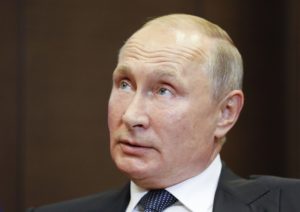Regional Autonomy: The Answer to Ukraine’s Woes
Writing in The New York Review of Books, Anatol Lieven argues that the trend toward militarism in Ukraine is not only extremely dangerous, but pointless. Protesters in Kiev strengthen their barricades after clashes with police. snames / Shutterstock.com
Protesters in Kiev strengthen their barricades after clashes with police. snames / Shutterstock.com
Writing in The New York Review of Books, Anatol Lieven argues that the trend toward militarism in Ukraine is not only extremely dangerous, but pointless.
Even if Ukrainian forces retook rebellious towns, it would only entice further Russian intervention, he stresses. And the West, despite heated rhetoric, appeals unwilling to enter into direct conflict.
So what is the solution? Lieven explains:
What is truly strange and terrible about this looming disaster is that all the leading players already know and agree about what the only solution can be, even if they disagree on the details and the timing: a federal Ukraine with elected regional governments and robust protection for regional interests. This, not further separation, is what Moscow is proposing; and this is what the Ukrainian interim president, Olexander Turchynov, has publicly hinted at for the Donbas. Although the rebels in Donetsk and other eastern cities have declared the Donetsk Republic and are now planning an independence referendum on May 11, many easterners, too, have indicated that they want some kind of federalization and not independence or annexation to Russia. As interviews published in Sunday’s New York Times make clear, even some rebel commanders themselves hope to keep Ukraine united.
It is extremely important to note that regional autonomy—accompanied by a threat of independence—is what the government of the western region of Lviv, controlled by Ukrainian nationalists, declared for itself back in February, when it seemed that President Yanukovych would remain in power and take Ukraine into the Russian-dominated Eurasian Union. If Lviv could demand this as an insurance for its identity and interests when the national government was going in a direction it did not like, it is very hard to argue that Donetsk does not have the right to do the same. Nor is there any moral reason why the West cannot support federalization. The United States, Germany, Canada, and half a dozen other Western democracies are all federal states. Of course, we all know that a fundamental moral principle of Western foreign policy is that sauce for the goose can never under any circumstances be sauce for the gander—but to oppose a federal solution for Ukraine on such grounds is ridiculous.
Indeed, a constitutional solution to the crisis has already been supported by all sides—including Russia, the US, and Ukraine—in the Geneva Declaration of April 17, which called for Ukrainians from all parts of the country to disarm and take part in a national dialogue that would recognize regional interests. The problem with Geneva is that it did not set out an outline of the constitutional settlement—which will have to be agreed in advance before the rebel militias in eastern Ukraine will put down their weapons. There is also of course profound disagreement on the process by which constitutional change should be introduced, and how much regional autonomy should be granted.
According to the author, even those parts of Ukraine that identify with Russia and fear the new government in Kiev would prefer to remain part of Ukraine, unless forced to choose. “Ukraine contains different identities, and cannot be ruled unilaterally by one of them alone, or pulled in a single geopolitical direction, without risking the breakup of the country itself,” Lieven notes.
— Posted by Peter Z. Scheer
Your support matters…Independent journalism is under threat and overshadowed by heavily funded mainstream media.
You can help level the playing field. Become a member.
Your tax-deductible contribution keeps us digging beneath the headlines to give you thought-provoking, investigative reporting and analysis that unearths what's really happening- without compromise.
Give today to support our courageous, independent journalists.






You need to be a supporter to comment.
There are currently no responses to this article.
Be the first to respond.